

| 'Cruising' the Caspian Sea | |
Baku (Azerbaijan), September 24th 2015
|
|
|
|
|
One of the most memorable boat trips in the world is undoubtedly the crossing of the Caspian Sea between Kazakhstan and Azerbaijan. The boat crossing was once popular, when flying was still expensive. But nowadays you fly in 65 minutes from Aktau (Kazakhstan) to Baku (Azerbaijan) for less than 80 Euro. The very basic cargo boats on the other hand, costs a whopping 100 Euro per person and lasts somewhere between one and four days. Hence, not many people are opting for the boat anymore. Only truckers, travellers with their own vehicles, and some backpackers opt for this form of self-flagellation. There is no set schedule for ships between Kazakhstan and Azerbaijan. Some cargo boats sail this route, and only a few of them is prepared to carry passengers. However, the transport of cargo is their main activity, so expect no service on board. All you get is a bed, a dirty toilet and shower you probably want to avoid. Below, we briefly set out the experience of our Caspian voyage. |
|
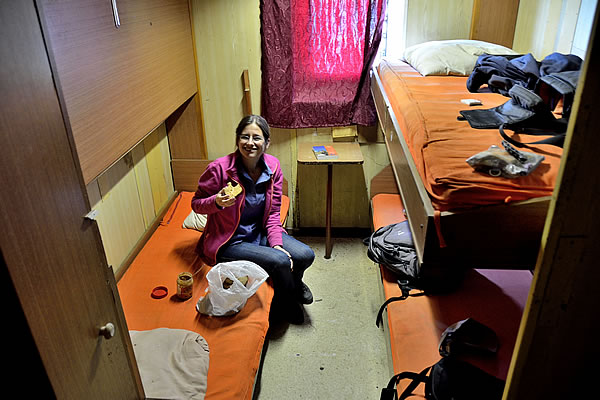 |
|
Ivonne in cabin of the Akademik Hesen Aliyev |
|
Preparation We have done the route from Kazakhstan to Azerbaijan. When we arrived in Aktau we immediately went to one of the travel agencies that sell tickets for cargo boats. We chose the unnamed agent in Mikrorayon 5, apartment block 29, apartment 1 / N43° 38.219' E51° 09.439'). When we arrived at the travel agency, it was not known yet when the next ship would leave to Baku. We left a copy of our passports and our phone number. The lady from the travel agency, which, incidentally, spoke a little bit of English, promised to call as soon as she knew when the next ship was going to make the crossing. Eventually, she called us two days later, noting that the next morning a boat would leave. We were asked to come directly to the agency to get our tickets. The lady of the travel agency first asked us again if we really wanted to go with the boat. She made the gesture of a flying plane to make it clear once again that flying is the better option. When her powers of persuasion proved not to be enough, she took our US $ 120 per person and told us that we have to bring enough food on the boat. The boat was planned to leave next morning at seven o'clock. "Make sure that you are already in the harbour at six o'clock so you have enough time to go through immigration and customs," is what she said just before we left her office. Day 1 The next morning at five o'clock we took a taxi to the port. When we got there it was deserted. A security officer summoned us to sit in a waiting area of the customs. All offices were still closed. On one of the windows was a note that said that the customs department would open at half past nine, so we got the impression that the boat would definitely not leave at seven. At half past nine, indeed, the first counters opened, but otherwise nothing happened. Only at eleven o'clock we were allowed to go through customs and immigration in order to go to the boat. Meanwhile the group of travellers had increased to a total of seven. Besides us, a Pole with a jeep, a Briton, two American-Chinese with off-road motorcycles and an Israeli. We brought enough food and water for three days. Eight litres of water, Nescafe coffee, five loaves of bread, a jar of peanut butter, two bags of chips, 10 Snickers bars and two meals of instant noodles. As only a few people were on the ship, it had the feel of a ghost ship. We were free to explore the ship, and only when they saw us in the engine room, we were asked to avoid this area of the ship. The upper deck was a perfect place to enjoy the view while enjoying a cup of coffee and sharing stories with other travellers. The cargo deck of the vessel filled very slowly, so the suspicion was growing that we wouldn’t probably leave today. Because, as we know from our experience in this part of the world, they would never leave with a half-empty car, bus, truck or ship. We went to sleep late in the evening, while the boat was still in the port of Aktau. |
|
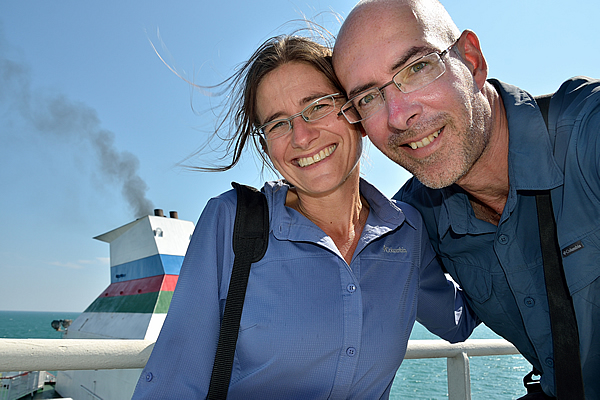 |
|
Selfi on the deck |
|
Day 2 At a quarter to seven in the morning there was a knock on the door of our cabin. It was an immigration officer who once again wanted to check our passports. He assured us that we were about to leave. Eventually we left a quarter to nine in the morning, with a 26 hour delay. During the first three hours of the journey, we only sailed with a speed of 15 kilometres per hour according to our GPS. The total distance of the crossing is about 550 kilometres, so we quickly figured out that we were probably on a 36 hours journey. But soon after, the boat ‘accelerated’ to more than 22 kilometres per hour, giving us the hope that we would arrive the next morning at around ten o'clock in the port of Alat. Alat is the location of the new port of Baku, which is located about 70 kilometres south of the capital. This is nowadays the harbour where most Baku boats arrive and depart. The weather was beautiful. We spent the most time on the upper deck, drank coffee, chatted with other passengers and occasionally roamed through the deserted parts of the ship. The staff of the vessel consisted of about 15 men and 5 women. The men kept the ship operational, while the women were mainly found in the kitchen and the laundry room. The ladies cooked only for the staff, but if you were willing to pay a few dollars, they were also willing to make a simple meal for the passengers on board. Today we went to bed with the comfortable idea that we would be arriving the next morning in Alat. Day three At about half past eight in the morning we felt in our cabin that the engines of the ship were shut off. The buzz and vibration of the engines disappeared and we heard loud chatter, which appeared to be the dropping of the anchors. We walked quickly to the upper deck with the expectation that we finally arrived. And so it was, although we were still 10 kilometres from the coast. With the binoculars we saw that the two docks of the port were both occupied, so we had to wait our turn. As our boat had rail wagons on board, we had to wait for a dock with a rail connection. The captain assured us that it would take up to four hours. But we didn’t have a lot of trust anymore in the captain, because of his false predictions in recent days. The four hours passed, and we saw that the crew was still fishing, which we interpreted as a sign that there was nothing to change soon. At three o'clock in the afternoon we saw with the binoculars that one dock was empty and ten minutes later the anchor was retrieved. The engines were started and before the huge black plumes of smoke were gone, we sailed towards the port. Mooring lasted over half an hour because pusher boats us had to manoeuvre us into the right position, because our ship did not have the engines to make short turns. At four o'clock in the afternoon we got our passports back and we were able to disembark ship. More than 57 hours after our scheduled departure time we set foot on Azerbaijani soil. For the both of us, the first time. |
|
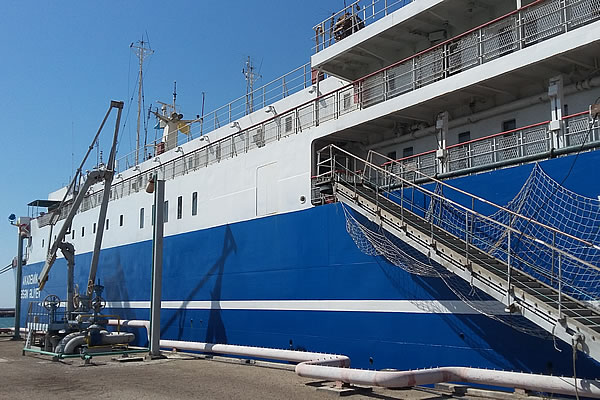 |
|
The Akademik Hesen Aliyev in the harbour of Aktau |
|
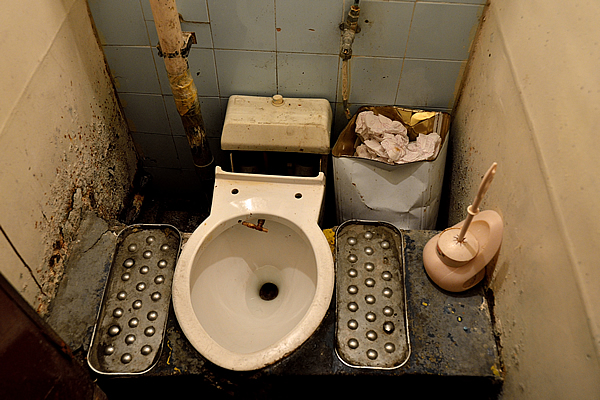 |
|
Toilet. Just for heroes ... or losers ?!?! |
|
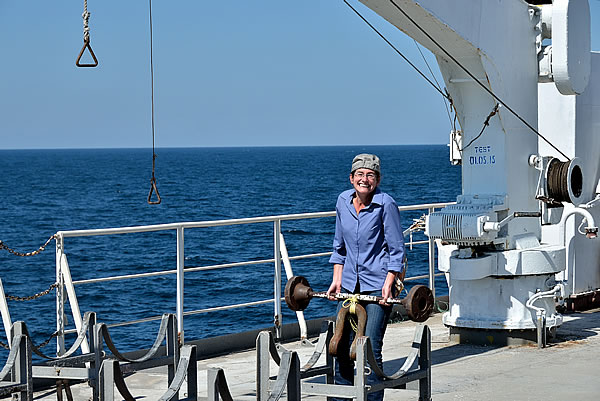 |
|
Ivonne using the fitness equipment of the boat's personnel |
|
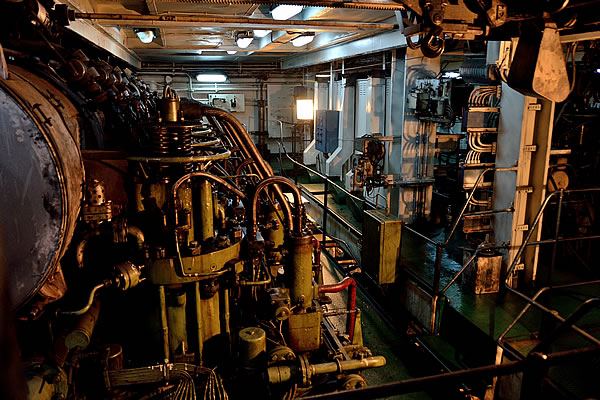 |
|
One of the two gigantic engines |
|
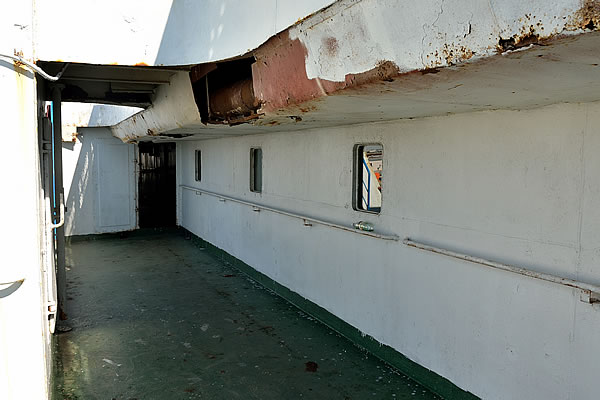 |
|
Some paint will do here |
|
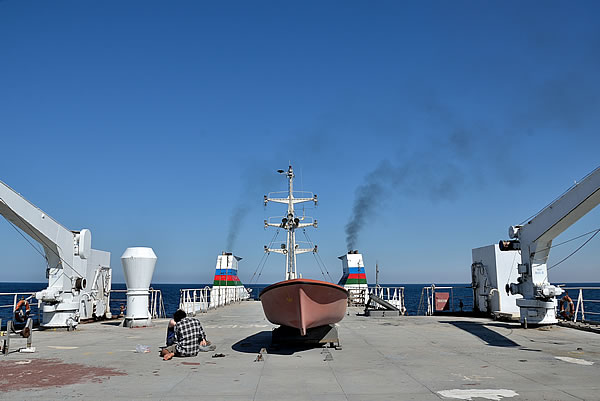 |
|
Relaxing on the deck of the Akademik Hesen Aliyev © copyright - Babakoto.eu / 2015 |
|